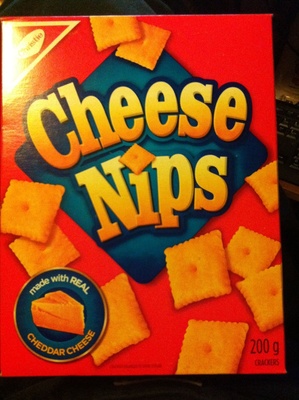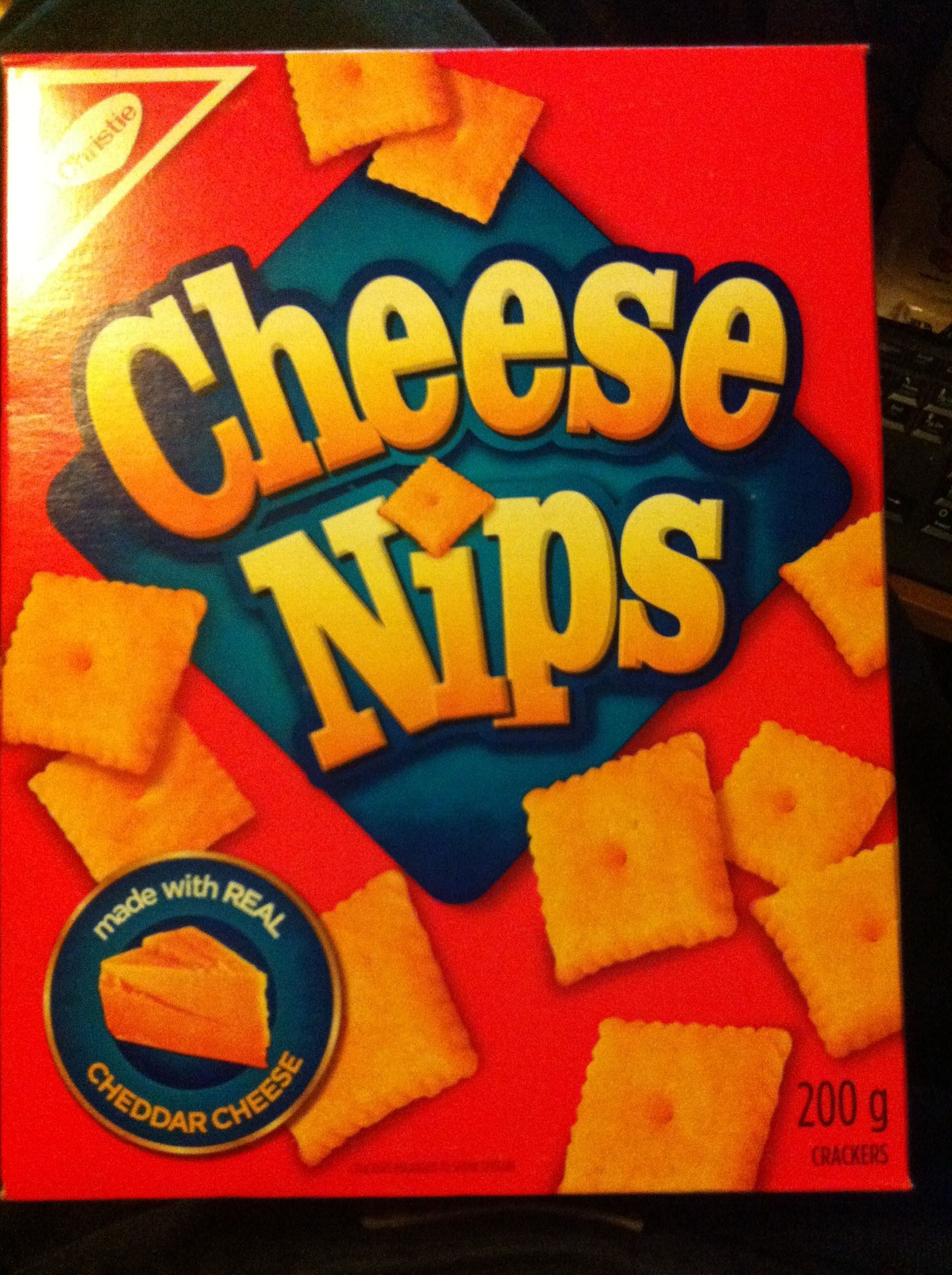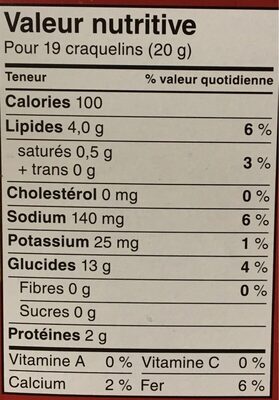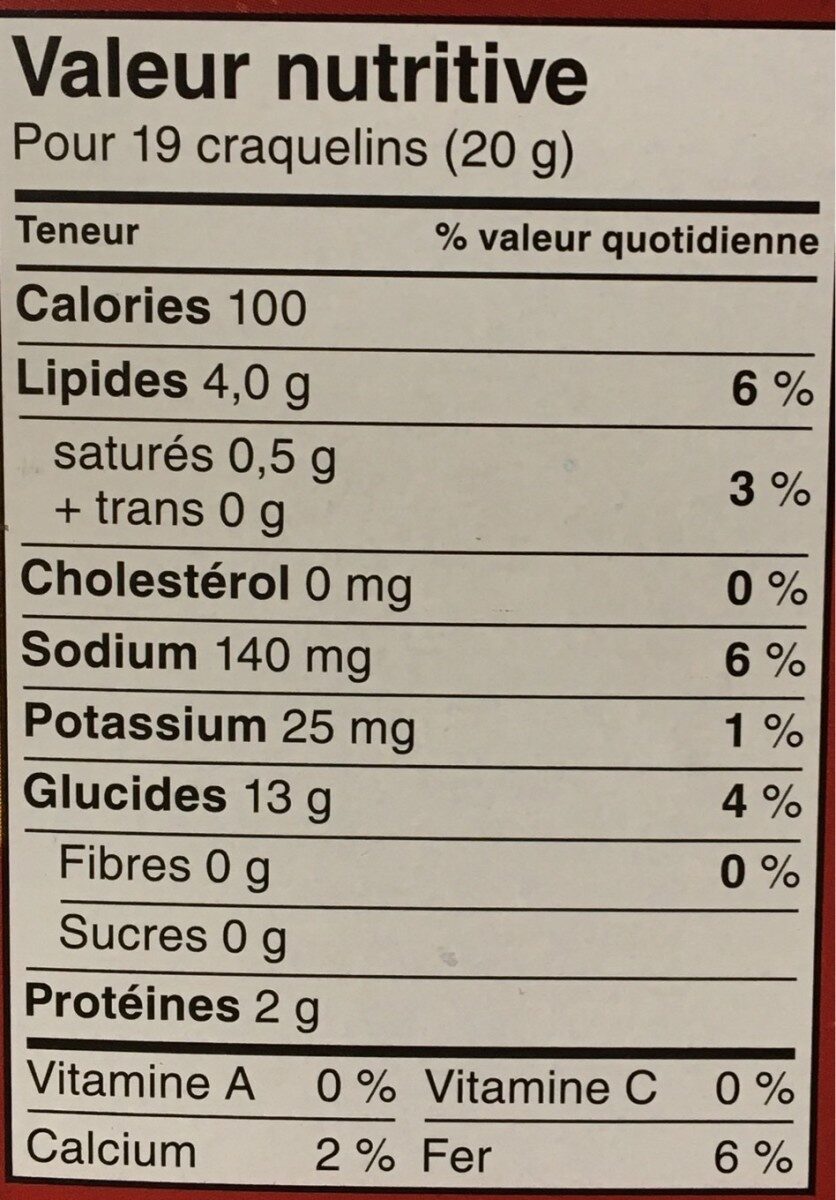Help us make food transparency the norm!
As a non-profit organization, we depend on your donations to continue informing consumers around the world about what they eat.
The food revolution starts with you!
Cheese nips cheddar baked snack crackers - Christie - 200 g
Cheese nips cheddar baked snack crackers - Christie - 200 g
This product page is not complete. You can help to complete it by editing it and adding more data from the photos we have, or by taking more photos using the app for Android or iPhone/iPad. Thank you!
×
Barcode: 0066721002228 (EAN / EAN-13) 066721002228 (UPC / UPC-A)
Common name: cheddar cheese crackers
Quantity: 200 g
Packaging: Box
Categories: Snacks, Salty snacks, Appetizers, Crackers
Labels, certifications, awards: Made with real cheddar cheese
Manufacturing or processing places: Mississauga ON Canada
Countries where sold: Canada
Matching with your preferences
Health
Ingredients
-
16 ingredients
Enriched wheat flour, vegetable oil, cheddar cheese (from milk), salt, autolyzed yeast extract, enzyme modified cheese, monosodium glutamate, monocalcium phosphate, spices, annatto extract, yeast, pentosanase, potassium chloride, protease, amylase.Allergens: GlutenTraces: Gluten, Milk
Food processing
-
Ultra processed foods
Elements that indicate the product is in the 4 - Ultra processed food and drink products group:
- Additive: E621 - Monosodium glutamate
Food products are classified into 4 groups according to their degree of processing:
- Unprocessed or minimally processed foods
- Processed culinary ingredients
- Processed foods
- Ultra processed foods
The determination of the group is based on the category of the product and on the ingredients it contains.
Additives
-
E1100 - Alpha-Amylase
Amylase: An amylase -- is an enzyme that catalyses the hydrolysis of starch into sugars. Amylase is present in the saliva of humans and some other mammals, where it begins the chemical process of digestion. Foods that contain large amounts of starch but little sugar, such as rice and potatoes, may acquire a slightly sweet taste as they are chewed because amylase degrades some of their starch into sugar. The pancreas and salivary gland make amylase -alpha amylase- to hydrolyse dietary starch into disaccharides and trisaccharides which are converted by other enzymes to glucose to supply the body with energy. Plants and some bacteria also produce amylase. As diastase, amylase was the first enzyme to be discovered and isolated -by Anselme Payen in 1833-. Specific amylase proteins are designated by different Greek letters. All amylases are glycoside hydrolases and act on α-1‚4-glycosidic bonds.Source: Wikipedia
-
E1101 - Protease
Protease: A protease -also called a peptidase or proteinase- is an enzyme that performs proteolysis: protein catabolism by hydrolysis of peptide bonds. Proteases have evolved multiple times, and different classes of protease can perform the same reaction by completely different catalytic mechanisms. Proteases can be found in Animalia, Plantae, Fungi, Bacteria, Archaea and viruses.Source: Wikipedia
-
E341 - Calcium phosphates
Calcium phosphate: Calcium phosphate is a family of materials and minerals containing calcium ions -Ca2+- together with inorganic phosphate anions. Some so-called calcium phosphates contain oxide and hydroxide as well. They are white solids of nutritious value.Source: Wikipedia
-
E341i - Monocalcium phosphate
Calcium phosphate: Calcium phosphate is a family of materials and minerals containing calcium ions -Ca2+- together with inorganic phosphate anions. Some so-called calcium phosphates contain oxide and hydroxide as well. They are white solids of nutritious value.Source: Wikipedia
-
E621 - Monosodium glutamate
Monosodium glutamate: Monosodium glutamate -MSG, also known as sodium glutamate- is the sodium salt of glutamic acid, one of the most abundant naturally occurring non-essential amino acids. Glutamic acid is found naturally in tomatoes, grapes, cheese, mushrooms and other foods.MSG is used in the food industry as a flavor enhancer with an umami taste that intensifies the meaty, savory flavor of food, as naturally occurring glutamate does in foods such as stews and meat soups. It was first prepared in 1908 by Japanese biochemist Kikunae Ikeda, who was trying to isolate and duplicate the savory taste of kombu, an edible seaweed used as a base for many Japanese soups. MSG as a flavor enhancer balances, blends, and rounds the perception of other tastes.The U.S. Food and Drug Administration has given MSG its generally recognized as safe -GRAS- designation. A popular belief is that large doses of MSG can cause headaches and other feelings of discomfort, known as "Chinese restaurant syndrome," but double-blind tests fail to find evidence of such a reaction. The European Union classifies it as a food additive permitted in certain foods and subject to quantitative limits. MSG has the HS code 29224220 and the E number E621.Source: Wikipedia
Ingredients analysis
-
May contain palm oil
Ingredients that may contain palm oil: Vegetable oil
-
Non-vegan
Non-vegan ingredients: Cheddar, MilkSome ingredients could not be recognized.
We need your help!
You can help us recognize more ingredients and better analyze the list of ingredients for this product and others:
- Edit this product page to correct spelling mistakes in the ingredients list, and/or to remove ingredients in other languages and sentences that are not related to the ingredients.
- Add new entries, synonyms or translations to our multilingual lists of ingredients, ingredient processing methods, and labels.
If you would like to help, join the #ingredients channel on our Slack discussion space and/or learn about ingredients analysis on our wiki. Thank you!
-
Vegetarian status unknown
Unrecognized ingredients: Enzyme-modified-cheese, PentosanaseSome ingredients could not be recognized.
We need your help!
You can help us recognize more ingredients and better analyze the list of ingredients for this product and others:
- Edit this product page to correct spelling mistakes in the ingredients list, and/or to remove ingredients in other languages and sentences that are not related to the ingredients.
- Add new entries, synonyms or translations to our multilingual lists of ingredients, ingredient processing methods, and labels.
If you would like to help, join the #ingredients channel on our Slack discussion space and/or learn about ingredients analysis on our wiki. Thank you!
-
Details of the analysis of the ingredients
We need your help!
Some ingredients could not be recognized.
We need your help!
You can help us recognize more ingredients and better analyze the list of ingredients for this product and others:
- Edit this product page to correct spelling mistakes in the ingredients list, and/or to remove ingredients in other languages and sentences that are not related to the ingredients.
- Add new entries, synonyms or translations to our multilingual lists of ingredients, ingredient processing methods, and labels.
If you would like to help, join the #ingredients channel on our Slack discussion space and/or learn about ingredients analysis on our wiki. Thank you!
: Enriched wheat flour, vegetable oil, cheddar cheese (from milk), salt, autolyzed yeast extract, enzyme modified cheese, monosodium glutamate, monocalcium phosphate, spices, annatto, yeast, pentosanase, potassium chloride, protease, amylase- Enriched wheat flour -> en:fortified-wheat-flour - vegan: yes - vegetarian: yes - ciqual_proxy_food_code: 9410 - percent_min: 6.66666666666667 - percent_max: 100
- vegetable oil -> en:vegetable-oil - vegan: yes - vegetarian: yes - from_palm_oil: maybe - percent_min: 0 - percent_max: 50
- cheddar cheese -> en:cheddar - vegan: no - vegetarian: maybe - ciqual_food_code: 12726 - percent_min: 0 - percent_max: 33.3333333333333
- from milk -> en:milk - vegan: no - vegetarian: yes - ciqual_proxy_food_code: 19051 - percent_min: 0 - percent_max: 33.3333333333333
- salt -> en:salt - vegan: yes - vegetarian: yes - ciqual_food_code: 11058 - percent_min: 0 - percent_max: 1.75
- autolyzed yeast extract -> en:autolyzed-yeast-extract - vegan: yes - vegetarian: yes - percent_min: 0 - percent_max: 1.75
- enzyme modified cheese -> en:enzyme-modified-cheese - percent_min: 0 - percent_max: 1.75
- monosodium glutamate -> en:e621 - vegan: yes - vegetarian: yes - percent_min: 0 - percent_max: 1.75
- monocalcium phosphate -> en:e341i - vegan: yes - vegetarian: yes - percent_min: 0 - percent_max: 1.75
- spices -> en:spice - vegan: yes - vegetarian: yes - percent_min: 0 - percent_max: 1.75
- annatto -> en:e160b - vegan: yes - vegetarian: yes - percent_min: 0 - percent_max: 1.75
- yeast -> en:yeast - vegan: yes - vegetarian: yes - percent_min: 0 - percent_max: 1.75
- pentosanase -> en:pentosanase - percent_min: 0 - percent_max: 1.75
- potassium chloride -> en:e508 - vegan: yes - vegetarian: yes - percent_min: 0 - percent_max: 1.75
- protease -> en:e1101 - vegan: yes - vegetarian: yes - percent_min: 0 - percent_max: 1.75
- amylase -> en:e1100 - vegan: yes - vegetarian: yes - percent_min: 0 - percent_max: 1.75
Nutrition
-
Poor nutritional quality
⚠ ️Warning: the amount of fruits, vegetables and nuts is not specified on the label, it was estimated from the list of ingredients: 0This product is not considered a beverage for the calculation of the Nutri-Score.
Positive points: 0
- Proteins: 5 / 5 (value: 10, rounded value: 10)
- Fiber: 0 / 5 (value: 0, rounded value: 0)
- Fruits, vegetables, nuts, and colza/walnut/olive oils: 0 / 5 (value: 0, rounded value: 0)
Negative points: 15
- Energy: 6 / 10 (value: 2092, rounded value: 2092)
- Sugars: 0 / 10 (value: 0, rounded value: 0)
- Saturated fat: 2 / 10 (value: 2.5, rounded value: 2.5)
- Sodium: 7 / 10 (value: 700, rounded value: 700)
The points for proteins are not counted because the negative points are greater or equal to 11.
Nutritional score: (15 - 0)
Nutri-Score:
-
Nutrient levels
-
Fat in moderate quantity (20%)
What you need to know- A high consumption of fat, especially saturated fats, can raise cholesterol, which increases the risk of heart diseases.
Recommendation: Limit the consumption of fat and saturated fat- Choose products with lower fat and saturated fat content.
-
Saturated fat in moderate quantity (2.5%)
What you need to know- A high consumption of fat, especially saturated fats, can raise cholesterol, which increases the risk of heart diseases.
Recommendation: Limit the consumption of fat and saturated fat- Choose products with lower fat and saturated fat content.
-
Sugars in low quantity (0%)
What you need to know- A high consumption of sugar can cause weight gain and tooth decay. It also augments the risk of type 2 diabetes and cardio-vascular diseases.
Recommendation: Limit the consumption of sugar and sugary drinks- Sugary drinks (such as sodas, fruit beverages, and fruit juices and nectars) should be limited as much as possible (no more than 1 glass a day).
- Choose products with lower sugar content and reduce the consumption of products with added sugars.
-
Salt in high quantity (1.75%)
What you need to know- A high consumption of salt (or sodium) can cause raised blood pressure, which can increase the risk of heart disease and stroke.
- Many people who have high blood pressure do not know it, as there are often no symptoms.
- Most people consume too much salt (on average 9 to 12 grams per day), around twice the recommended maximum level of intake.
Recommendation: Limit the consumption of salt and salted food- Reduce the quantity of salt used when cooking, and don't salt again at the table.
- Limit the consumption of salty snacks and choose products with lower salt content.
-
-
Nutrition facts
Nutrition facts As sold
for 100 g / 100 mlCompared to: Crackers Energy 2,092 kj
(500 kcal)+11% Fat 20 g +16% Saturated fat 2.5 g -38% Carbohydrates 65 g +5% Sugars 0 g -100% Fiber 0 g -100% Proteins 10 g +4% Salt 1.75 g -5% Alcohol 0 % vol Vitamin A 0 µg (0 % DV) -100% Vitamin C (ascorbic acid) 0 mg (0 % DV) -100% Calcium 20 mg (2 % DV) -69% Iron 1.08 mg (6 % DV) -65% Fruits‚ vegetables‚ nuts and rapeseed‚ walnut and olive oils (estimate from ingredients list analysis) 0 %
Environment
-
Eco-Score B - Low environmental impact
⚠ ️Select a country in order to include the full impact of transportation.The Eco-Score is an experimental score that summarizes the environmental impacts of food products.→ The Eco-Score was initially developped for France and it is being extended to other European countries. The Eco-Score formula is subject to change as it is regularly improved to make it more precise and better suited to each country.Life cycle analysis
-
Average impact of products of the same category: A (Score: 87/100)
Category: Salty snacks, crackers, plain
Category: Salty snacks, crackers, plain
- PEF environmental score: 0.22 (the lower the score, the lower the impact)
- including impact on climate change: 1.59 kg CO2 eq/kg of product
Stage Impact Agriculture
59.7 %Processing
22.4 %Packaging
10.6 %Transportation
5.2 %Distribution
2.2 %Consumption
0.0 %
Bonuses and maluses
-
Missing origins of ingredients information
Malus: -5
⚠ ️ The origins of the ingredients of this product are not indicated.
If they are indicated on the packaging, you can modify the product sheet and add them.
If you are the manufacturer of this product, you can send us the information with our free platform for producers.
-
Packaging with a medium impact
Malus: -10
Shape Material Recycling Impact Box Unknown High ⚠ ️ The information about the packaging of this product is not sufficiently precise (exact shapes and materials of all components of the packaging).⚠ ️ For a more precise calculation of the Eco-Score, you can modify the product page and add them.
If you are the manufacturer of this product, you can send us the information with our free platform for producers.
Eco-Score for this product
-
Impact for this product: B (Score: 72/100)
Product: Cheese nips cheddar baked snack crackers - Christie - 200 g
Life cycle analysis score: 87
Sum of bonuses and maluses: -15
Final score: 72/100
-
Carbon footprint
-
Equal to driving 0.8 km in a petrol car
159 g CO² per 100g of product
The carbon emission figure comes from ADEME's Agribalyse database, for the category: Salty snacks, crackers, plain (Source: ADEME Agribalyse Database)
Stage Impact Agriculture
53.6 %Processing
18.8 %Packaging
17.7 %Transportation
8.7 %Distribution
1.2 %Consumption
0.0 %
Packaging
-
Packaging with a medium impact
-
Packaging parts
Box
-
Packaging materials
Material % Packaging weight Packaging weight per 100 g of product
-
Transportation
-
Origins of ingredients
Missing origins of ingredients information
⚠ ️ The origins of the ingredients of this product are not indicated.
If they are indicated on the packaging, you can modify the product sheet and add them.
If you are the manufacturer of this product, you can send us the information with our free platform for producers.Add the origins of ingredients for this product Add the origins of ingredients for this product
Report a problem
-
Incomplete or incorrect information?
Category, labels, ingredients, allergens, nutritional information, photos etc.
If the information does not match the information on the packaging, please complete or correct it. Open Food Facts is a collaborative database, and every contribution is useful for all.
Data sources
Product added on by openfoodfacts-contributors
Last edit of product page on by packbot.
Product page also edited by carlene, kiliweb, upcbot, yuka.VZpTA-6FNM0OR8vtiawN4gqpL_X_Bs9oFVsJog.









